RBSE Solutions for Class 3 English Chapter 3 The Clever Minister
Rajasthan Board RBSE Solutions for Class 3 English Let's Learn English Chapter 3 The Clever Minister Textbook Exercise Questions and Answers.
The questions presented in the RBSE Solutions for Class 3 English are solved in a detailed manner. Get the accurate RBSE Solutions for Class 3 all subjects will help students to have a deeper understanding of the concepts.
RBSE Class 3 English Solutions Chapter 3 The Clever Minister
Activity-I
A. Write T for true and F for false statements.
सत्य कथन के लिए T तथा असत्य के लिए F लिखिए।
1. The king was thirsty. ( )
2. The minister was familiar with the forest. ( )
3. The minister fed sugar to the deer. ( )
4. The king got water. ( )
Answer:
1. T 2. F 3. F 4. T
B. Answer the following questions.
निम्न प्रश्नों के उत्तर दीजिए
Question 1.
What was the name of the king?
राजा का नाम क्या था?
Answer:
Somavarma was the name of the king.
राजा का नाम सोमवर्मा था।

Question 2.
Whose language did the king and his minister not know ?
राजा और उसका मंत्री किसकी भाषा नहीं जानते थे।
Answer:
The king and his minister did not know the deer's language.
राजा तथा उसका मंत्री हिरन की भाषा नहीं जानते थे।
Question 3.
Whom did the minister set free?
मंत्री ने किसको आजाद किया?
Answer:
The minister set the deer free.
मंत्री ने हिरन को आजाद किया।
Question 4.
Where did the deer go?
हिरन कहाँ पर गया?
Answer:
The deer went to water.
हिरन पानी के पास गया।
Activity-II.
A. Name two words on each petal which you find in the forest.
प्रत्येक पंखुड़ी पर दो नाम लिखिए जो आपको जंगल में मिलते हैं।
Answer:
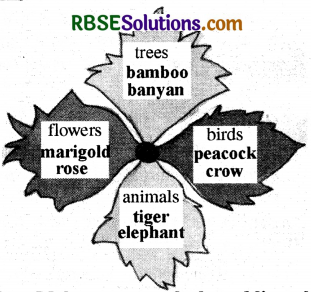

B. Make new words by adding the word 'every' given in the centre to the words given in the circle.
केन्द्र में दिए गए शब्द 'every' को घेरे में दिए गए शब्दों से जोड़ते हुए, नये शब्दों को बनाइए।
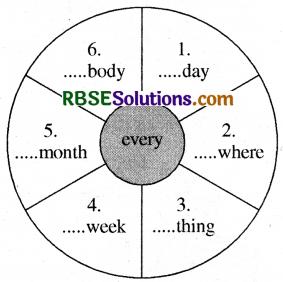
Answer:
1. everyday
2. everywhere
3. everything
4. everyweek
5. everymonth
6. everybody
C. Break the following words into two meaningful words. One word has been done for you.
निम्न शब्दों को दो अर्थपूर्ण शब्दों में विभाजित कीजिए। एक शब्द आपके लिए किया गया है।

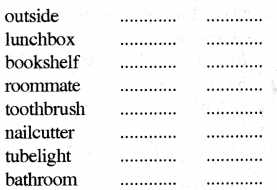
Answers:
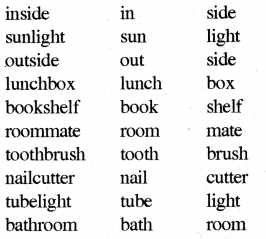
D. The words with '-ly' ending are usually known as adverbs. Change the words given in brackets by adding '-ly' to them
शब्द जो ‘-ly' के साथ समाप्त होते हैं, सामान्यतया क्रिया विशेषण जाने जाते हैं। नीचे कोष्ठकों में दिए गए शब्दों को ‘-ly' जोड़ते हुए, बदलिए।
1. ............ (Sudden) the minister noticed a flock of deer.
2. The new shoes are............(nice) made.
3. He is............(real) smart.
4. Let us sing............ . (soft)
Answer:
1. Suddenly
2. nicely
3. really
4. softly
(Activity-III)
Read the following sentences
निम्न वाक्यों को पढ़िए
• The deer will show us water.
• We don't know their language.
• The deer will show us water but we don't know their language.
Join the following sentences using 'but' as done above.
निम्न वाक्यों को 'but' का प्रयोग करते हुए ऊपर किए हुए की तरह जोडिए।
1. Aruna likes apples.
Ramakant likes oranges.
2. Rahim drives a car.
Sujan drives a bike.
3. Rahul watches a film.
Kalam reads a newspaper.
Answer:
1. Aruna likes apples but Ramakant likes oranges.
2. Rahim drives a car but Sujan drives a bike.
3. Rahul watches a film but Kalam reads a newspaper.

(Activity-IV)
You must have heard the following song. Recite the song in group and later recite yourself.
आपने निश्चित रूप से निम्न गाने को सुना होगा। इस गाने को समूह में ऊँचे स्वर में गायें तथा इसके बाद स्वयं गुनगुनाएँ। इन्दर राजा पानी दे. पानी दे गुड़धानी दे।
• Enjoy the song with your friends in your mother-tongue.
• अपनी मातृभाषा में इस गाने का अपने दोस्तों के साथ आनन्द लीजिए।
• Describe the scene of rain in your village/city.
• अपने गाँव/शहर में वर्षा के इस दृश्य का वर्णन कीजिए।
Answer:
My village looks very beautiful in the rain. Children like to wet in the rain. They make a noise. People become happy. Peacocks dance. All the villagers enjoy the rain.
वर्षा में मेरा गाँव बहुत सुन्दर दिखाई पड़ता है। बच्चे बरसात में भीगना पसन्द करते हैं। वे शोर मचाते हैं। लोग खुश होते हैं। मोर नाचते हैं। सभी गाँव वाले बरसात का आनन्द लेते हैं।
(Activity-V)
A. Look at the pictures given below. Write their names choosing from the box.
नीचे दिए गए चित्रों को देखिए। बॉक्स में से चुनते हुए उनके नाम लिखिए।
well, river, pond, stream, lake, tubewell, tanka, handpump
Answer:
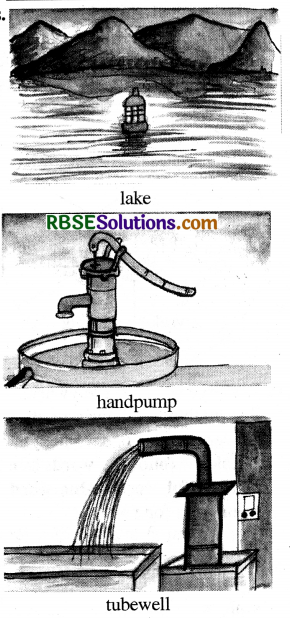
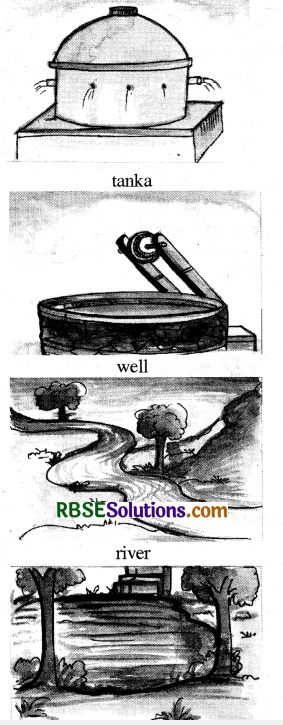
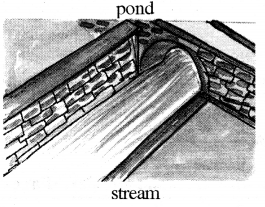

B. Draw a picture of a boat and colour it.
नाव का एक चित्र बनाइए तथा उसमें रंग भरिए।
Answer:
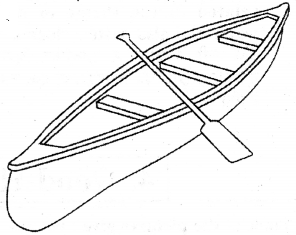
C. What do you see in the picture given below. Write five sentences about the following picture.
नीचे दिए गए चित्र में आप क्या देखते हैं? निम्न चित्र पर पाँच वाक्य लिखिए।
Answer:
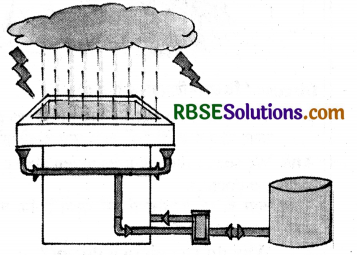
1. It is raining heavily.
भारी वर्षा हो रही है।
2. The clouds are thundering.
बादल गरज रहे हैं।
3. There is a rain water harvesting system.
यहाँ पर एक वर्षा जल संरक्षण प्रणाली है।
4. It is connected with an well.
यह एक कुएं से जुड़ा हुआ है।
5. Rain water is carried to the well by the pipes.
वर्षा जल को पाइपों द्वारा कुएं तक लाया जा रहा है।

D. Now design a poster or picture related to the theme of saving water and also write a slogan.
अब पानी के बचाव से सम्बन्धित विषय पर एक पोस्टर या चित्र बनाइए तथा एक नारा भी लिखिए।
Answers:
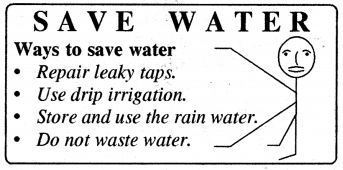
Slogan: Save water, It will save you.
The Clever Minister Summary and Translation in Hindi
आइए अब हम इस कहानी को पढ़ें
कठिन शब्दार्थ-minister (मिनिस्ट()) = मंत्री । clever (क्लेव) = चतुर, बुद्धिमान । king | (किंग्) = राजा | once (वन्स्) = एक बार। lost (लोस्ट्) = गुम गया, खो गया। forest (फॉरिस्ट) = जंगल, वन। thirsty (थस्टि) = प्यासा। want (वॉन्ट्) = चाहना। some (सम्) = कुछ। water (वॉट(२)) = पानी। get (गेट) = प्राप्त करना। familiar (फमिलिअ(1)) = सुपरिचित, जाना-पहचाना।
हिन्दी अनुवाद:
King Somavarma and his minister were once lost in the forest.
एक बार राजा सोमवर्मा तथा उसका मंत्री जंगल में खो गये।
King : Mantri, I'm thirsty. I want some water.
राजा : मंत्री, मैं प्यासा हूँ। मुझे कुछ पानी चाहिए।
Minister : (walking and thinking) Where can I get some water? I am not familiar with this forest?
मंत्री (टहलता हुआ तथा सोचता हुआ) मैं पानी कहाँ से प्राप्त कर सकता हूँ? मैं इस जंगल से सुपरिचित नहीं हूँ।

कठिन शब्दार्थ-sorry (सॉरि) = दुःखी, निराश। searched (सच्ट) = तलाश किया। everywhere (एवरिवेअ()) = सब जगह, सर्वत्र | drink (ड्रिङ्क्) = द्रव पदार्थ पीना। die (डाई)| = मरना । suddenly (सनलि) = अचानक। noticed (नोटिसूट) = देखा । flock (फ्लॉक्) = झुण्ड। deer (डि(२)) = हिरन । passing by (पासिंग बाइ) = गुजरते हुए। idea (आइडिआ) = योजना, विचार | these (दीज्) = ये। show (शो) = दिखाना। know (नो) = जानना । language (लैग्विज्) = भाषा | luggage (लगिज्) = सामान । salt (सॉल्ट्) = नमक। enough (इनफ्) = पर्याप्त, काफी। caught (कॉट्) = पकड़ा। feed (फीड्) = खिलाना।
हिन्दी अनुवाद: Minister: I'm sorry, Maharaj. I searched everywhere.
मंत्री : मुझे क्षमा करें, महाराज। मैंने प्रत्येक स्थान पर तलाश किया।
King : If I don't drink water, I'll die.
राजा : अगर मैंने पानी नहीं पीया, मैं मर जाऊँगा। (Suddenly the minister noticed a flock of deer passing by.] [
अचानक मंत्री ने हिरनों के एक झुण्ड को गुजरते हुए देखा।]
Minister: Maharaj, I have an idea.
These deer will show where water is.
मंत्री महाराज, मेरे पास एक योजना है।
ये हिरन दिखायेंगे कि पानी कहाँ पर है।
King : But we don't know their language.
राजा : लेकिन हम उनकी भाषा नहीं जानते हैं।
Minister: We have salt in our luggage. That is enough.
मंत्री : हमारे पास सामान में नमक है। यह पर्याप्त है।
[The minister caught a deer.]
[मंत्री ने एक हिरन को पकड़ा।]
Minister: Now I feed him all the salt.
मंत्री : अब मैं इसे पूरा नमक खिला देता हूँ।
कठिन शब्दार्थ-later (लेट्()) = बाद में। begun (बिगन्) = आरम्भ किया, शुरू किया। feel (फील्) = महसूस करना। now (नाउ) = अब। follow (फॉलो) = पीछा करना, अनुसरण करना। set free (सेट् फ्री) = आजाद करना, स्वतंत्र करना। ran (रेन्) = दौड़ा। look (लुक) = देखना । wisdom (विज्डम्) = समझदारी, बुद्धिमानी। marvellous (मावलस्) = बहुत बढ़िया।

हिन्दी अनुवाद - [A little later] (कुछ समय पश्चात्)
King : The deer has begun to feel thirsty.
राजा : हिरन प्यास महसूस करने लगा है।
Minister : Now we must follow him.
मंत्री : अब हमें उसका पीछा करना चाहिए।
[The minister set the deer free.]
[मंत्री ने उस हिरन को आजाद कर दिया।]
Minister : Come on. The deer is running in search of water.
Look water! : आओ। हिरन पानी की तलाश में दौड़ रहा है। देखो पानी!
King : Minister, your wisdom is marvellous.
राजा : मंत्री, आपकी बुद्धिमत्ता बहुत बढ़िया है। मंत्री

- RBSE Solutions for Class 3 English Chapter 8 Life Echoes
- RBSE Solutions for Class 3 English Chapter 6 Charbhujanath Mandir
- RBSE Solutions for Class 3 English Chapter 5 Swachh Bharat Abhiyan
- RBSE Solutions for Class 3 English Chapter 4 Good Habits
- RBSE Solutions for Class 3 English Chapter 2 A Smile with Blessing
- RBSE Class 3 English Vocabulary
- RBSE Class 3 English Grammar
- RBSE Solutions for Class 3 English Let's Learn English
- RBSE Class 3 English Story and Poster Writing
- RBSE Class 3 English Paragraph Writing
- RBSE Solutions for Class 3 English Chapter 15 Freedom Fighters of Rajasthan